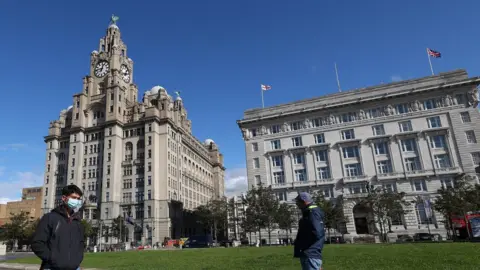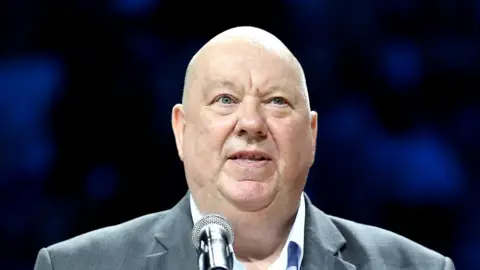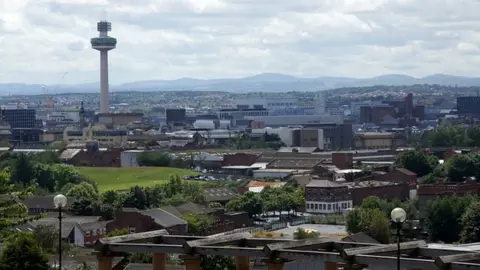Local elections 2021: Liverpool faces 'most unpredictable' city mayor poll
 PA Media
PA Media"It's the most unpredictable election I've seen in my political career," according to one of the candidates in Liverpool's battle to be the city's next directly elected mayor.
The contest was due to take place in May 2020, but was postponed due to the Covid pandemic.
It was then thrown into chaos at the start of this year when the previous mayor, Labour's Joe Anderson, stood down as the party's candidate following his arrest.
He denies wrongdoing and says he will fight to clear his name - but his political career appears to be over.
Labour's search for a new candidate was also described as "chaotic" and resulted in a different Anderson, this time Joanne - a councillor for just two years - being chosen by local Labour members.
If she wins, she'll make history as the first black woman elected to lead a British city.
But it's not as straightforward as business as usual for the Liverpool Labour party, which has run the city since 2010.

An inspection into aspects of the city's operations - ordered by the government - found a dysfunctional council, which frequently did deals that did not provide good value for tax payers.
The report has unsurprisingly provided the source material for all parties during this election campaign. And its ramifications do not end there.
The government has ordered independent commissioners to oversee aspects of Liverpool City Council - highways, regeneration and planning - for the next three years. This means officers and elected members - and the new mayor - might not have autonomy when it comes to making decisions about investment, building contracts and land deals.
The Labour party has launched its own investigation, which their candidate Joanne Anderson says she completely supports.
She was intending to stand down as a ward councillor this May, but was persuaded by supporters to stand for the top job.
Critics say she lacks the experience to manage Liverpool's multimillion-pound budgets, but Labour's national leader Sir Keir Starmer described her as "a breath of fresh air".
She says 200 people contributed to her manifesto, which focuses on transparency, social inclusion and improving education, and she says the "shocking" Caller Report can be "a springboard to improving our culture, transforming how we do things and providing a new, fresh approach for our city".
Short-lived role?
Labour only gained control of Liverpool in 2010. Before that, the Liberal Democrats were in charge for a decade.
Their candidate Richard Kemp sees the report as his chance to build back support for his party as well as win the mayoralty - though he says he would scrap the job within minutes of victory, if he could.
And that's another thing - should Liverpool even have a directly elected mayor at all?
The city did not have a referendum on the issue before Joe Anderson went from council leader to being elected mayor in 2012.
Following several attempts by opposition parties to scrap the role, the council voted to commit to a referendum on the future governance of the city in 2023.
 PA Media
PA MediaJoanne Anderson says she will campaign to scrap the role and effectively sack herself if she gets elected. It may be a very short-lived role.
However, Liberal candidate Steve Radford, a councillor for nearly 40 years, reckons the mayor is a role worth having and credits it with seeing Liverpool through the austerity years and, to an extent, the pandemic.
Independent candidates taking on the might of the party machines do not always make a mark, but charity founder Stephen Yip says he has spoken to voters across the city who are ready for a "non-politician" to lead it.
He is proposing to set up people's assemblies across Liverpool to give voters more direct access to decision-making and says the "one thing our city needs is accountability, transparency and independent oversight".
He would bring in a whistleblowers commission for council employees, to directly address the issues raised in the Caller report.
Liverpool's Green candidate is not a huge fan of the role of mayor either.
Tom Crone says his twin aims are to clean up the city's politics and clean up the city's air quality.
Liverpool City Council declared a climate emergency two years ago and young voters particularly say the environment is their top priority, but Mr Crone claims the city has barely paid lip service to its desire to cut carbon emissions and tackle climate change.
It may not be glamorous, but bus routes and cycling safety are huge priorities on the doorstep.
 Mike Pennington/Geograph
Mike Pennington/GeographAs is the city's economic recovery from Covid. Roger Bannister, who is standing for the Trade Union and Socialist Coalition reckons there's still a north-south divide in Liverpool, with places like Kirkdale and Everton rarely being prioritised by decision-makers, who prefer the leafy suburbs of the south for attention.
But it is in those leafy suburbs where voters may switch away from Labour, though Conservative candidate Katie Burgess faces an uphill struggle to victory on 6 May.
In 2012, the Conservative candidate in the city's first ever mayoral election finished seventh on 4.49% of the vote to Labour's 59.33%, while four years later, the Tories polled just 3.6%, and there has not been a Conservative councillor on the Town Hall's benches since 1998.
Ms Burgess believes the biggest challenge facing the city's next mayor is recovering public trust.
She says the Caller Report has "been devastating" to the city, but as a result, "never has there been a better time to head to the ballot box".
Quite what Liverpool's residents will do once they get there is, for the first time in a while, anyone's guess.

The candidates for the election are (listed alphabetically):

ENGLAND'S ELECTIONS: THE BASICS
What's happening? On 6 May, people across England will vote for new councillors, mayors and police and crime commissioners.
Why does it matter? When parties win control of a council, they decide policies for your area which could affect services ranging from social care to rubbish collection. Find out more about what councils do.
Who can vote? Anyone who lives in England, is registered to vote and aged 18 or over on 6 May is eligible. Find your local election here.

Why not follow BBC North West on Facebook, Twitter and Instagram? You can also send story ideas to [email protected]
